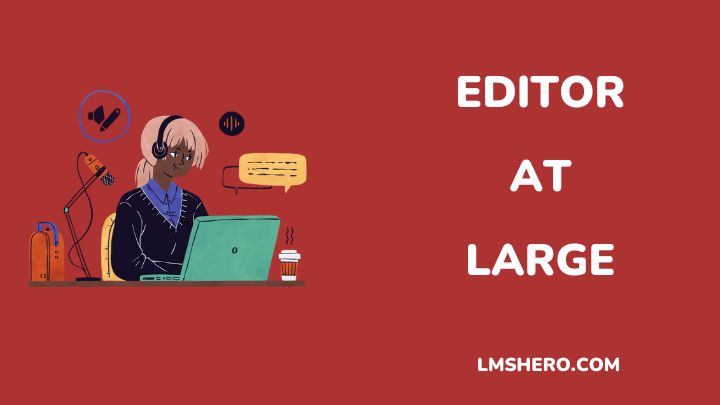The publication industry is very vast and includes advertising, writing, and editing, all of which serve human needs. The industry also has different roles, and the editor is at the top. But who is an editor at large?
The editor at large is the most important type in defining and maintaining the company’s vision for publishing its work.
Even though the role is somewhat difficult, it is very flexible, and they can work on different aspects of their interests, coupled with satisfactory pay.
This article explores what an editor at large does, their roles and responsibilities, and other relevant information about the role.
Read to find out more.
What is an editor at large?

An editor at large, also known as a roving reporter or roving editor, is a journalist who writes for magazines, newspapers, or websites but has no specific area of duty and is free to write on any topic that interests him or her.
The role of an editor at large is independent and focused on their passions, and is not necessarily bound to present their ideas to the company’s chief editor.
Editors at large also help in the selection of topics and stories to publish, monitor the collaborative writing process, filter the story, and discuss the trajectory of stories or articles written by other writers.
Responsibilities of an editor at large
This role involves a thorough understanding of the editorial process and strong communication, planning, and time management skills.
The following are some of the primary duties of an editor at large:
1. Come up with content ideas
One of the main responsibilities of an editor at large is to generate content to keep readers interested and informed about the magazine or website. They can also come up with topics and angles for articles and features.
Generally, they generate content ideas from the feedback given by the readers. Also, they can use keywords and topic research to identify suitable topics which the readers will find valuable and engaging.
Thus, learning about search engine optimization, keyword, and topic research will help you generate content ideas more frequently.
2. Help in the recruitment of editorial fellows
Editors at large also help hire editorial creatives such as writers, cartoonists, illustrators, graphic designers, and other experts to ensure that their works contain all of the features consumers want to see in the publication.
This can include writing job descriptions, working with the human resources department, interviewing freelance writers, and so on.
3. Set publishing standards
Another role of an editor at large is to set publication standards for other writers and editors in the company.
This involves several factors, such as choosing the tone of voice and drafting a style manual that writers are expected to follow when writing and conducting research.
To make sure the final draft properly reflects the objectives of the publication, editors at large can also specify the kind of English language to use, the publications and brands they can include in the article, and many other standards.
4. Editing and proofreading
Your responsibilities as an editor can also include editing and proofreading other writers’ work. This includes ensuring that articles are free of contextual, grammatical, and spelling errors.
Additionally, it can include fact-checking and confirming the validity of figures, names, and places referenced in the articles.
Further, editing also involves making sure writers cover all the themes specified in the content brief and follow the tone of voice, style guide, and word count for each article.
If the writer’s work is very poor, the editor can request revisions and set a new deadline for submission.
3. Advising the management
The editor at large can also act as an advisor to the management of the company. They can shed light on some patterns and developments which the company needs.
For example, they might notice that the readers desire more articles on a particular topic or prefer the company to produce content on a different platform. Perhaps readers now prefer audio versions of stories in its articles or want a podcast.
Such professional advice can improve the management’s decision-making and help them to make investments in areas that will benefit readers, boost long-term revenue value, and develop customer loyalty.
Requirements for becoming an editor at large
In general, the role prioritizes creativity, and for those with a passion for writing and who aspire to reach new heights, this is a dream profession.
The goal of being an editor at large is to showcase your best writing skills through study and research. As a result, the role requires passion, and you should write for yourself rather than for someone else.
The following are the general skills that an editor at large should have:
1. Creativity
The heart of writing is how words are put together, and the ability to communicate basic facts and facts compellingly is what creativity leans on.
Thus, being an editor at large requires creativity to develop innovative stories to attract more readers.
2. Dedication
In general, every job requires time and hard work. The value of your words will depend on how dedicated you are, even though the job title appears flexible.
3. Communication
Typically, communication is the basic skill required for a career in the publishing industry. It is necessary for communication between writers, editors, and different teams.
As an editor, good communication skills give a good impression, insight, and clear perspective to improve the readers’ experience.
4. Experience
Journalism and publishing careers rely on factors such as innovation and experience to avoid offending the public and causing unnecessary stirs. Hence, being experienced in writing and editing will help you make a better career as an editor.
5. Interpersonal skills
A good attitude toward colleagues and coworkers indicates a strong personality and work ethic. As a result, good interpersonal skills can afford you the opportunity to help your company with marketing, networking, and even its fundraising efforts.
6. Language proficiency
This role requires time and effort. Thus, the ability to write and speak fluently the language you will be working with is required.
7. Educational qualification
Often, the only academic requirement for editors is a bachelor’s degree, which is not always required. Typically, a degree in journalism, digital communication, English, or other language major is enough to become an editor at large.
How much does an editor at large earn?
According to Glassdoor, an editor at large earns about $95,030 annually in the United States.
FAQs
What is the difference between an editor at large and an editor in chief?
Although both editors and editors in chief are directly under the chief editors and executive editors, the editor at large role is more flexible as they work on whatever story interests them, unlike editors in chief.
What is the role above editor-in-chief?
The managing editor.
What are the various levels of editors?
They are; Editor in chief, managing editor, in-house editor, and copy editor.
Conclusion
The role of an editor is an attractive position that builds your writing, editing, communication skills, etc.
It is a combination of research, exploration, and creativity to convey ideas into compelling stories for the consumption of readers. Although the role might be challenging, it is a fairly lucrative career with great job opportunities.
I hope you found this article interesting. You can also read about some interesting humanities subjects and career opportunities.
Thanks for reading.







